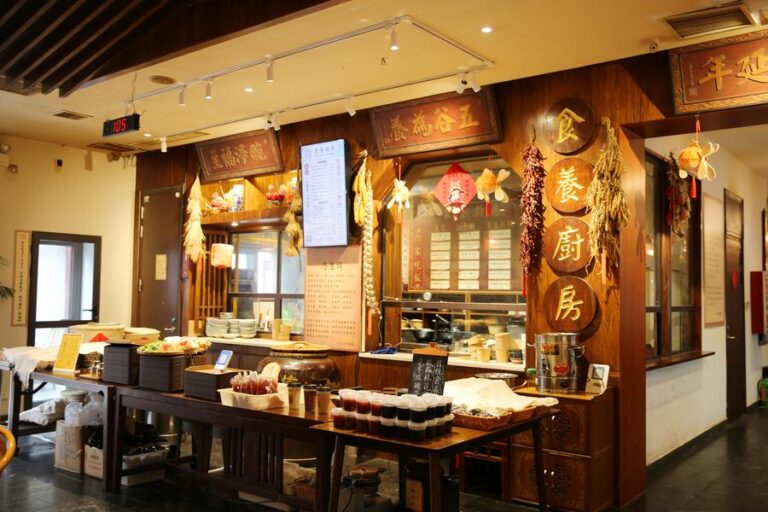ZHENGZHOU, Nov. 28 (Xinhua) — Qi Qi makes the hour-long drive to the center of Zhengzhou three times a week, purely to visit her favorite traditional Chinese medicine-themed restaurant.
“The flavors are light, the ingredients are fresh, and the diets are healthy,” she said.
The restaurant, affiliated to the Dongjitang traditional Chinese medicine (TCM) clinic, offers special dishes cooked with herbal medical ingredients, such as the perilla and fish rice noodles and ginger and jujube paste.
About 900 kilometers away in Hangzhou, capital of east China’s Zhejiang Province, in the 376-year-old Fang Hui Chun Tang TCM clinic, one of China’s time-honored brands, many young people were making sachets packed with redolence of herbal medicines.
A Ms. Ma born in the 1990s, who went by her English name Yelin, traveled all the way from Shanghai just for the handcraft. After carefully selecting the needed herbal ingredients, she ground them patiently. “The process of choosing the medical herbs with one’s own hands is reassuring, and the experience of grinding is unique,” she said.
According to Yang Leyi with the store, the sachets are of different functions: refreshing, soothing, soporiferous, etc. “The tranquilizing ones helping people sleep are especially welcomed by customers,” she told Xinhua. “By making the sachets themselves, the young people get to know TCM better.”
From ginseng pancakes to herbal tea, the rising aroma of medicinal herbs in modern life has transformed perceptions of TCM from a mere remedy for illness to a fashionable component of daily wellness in China.
Chinese people, especially the youths, are attaching increasing importance to health. The Future of Wellness survey by management consulting firm McKinsey earlier this year suggested that in China 94 percent of the consumers polled say wellness is a “top” or “important” priority, compared to 79 percent in Britain and 84 percent in the United States.
“With the increasing concern of Chinese young people about health management and their growing cultural identity, TCM has shown new vitality today,” said Lyu Peiwan, a professor with the Henan University of Chinese Medicine.
Wu Yueguo, professor with the Hangzhou Medical College, noted that the craze for TCM reflects the transformation of young people’s health concepts and a significant improvement in their understanding of TCM culture. “In the fast-paced modern society, young people generally face sub-health problems due to staying up late and sitting for a long time at work,” he said. “TCM meet the requirement of those people to ‘stay healthy in their daily life’, with varying forms spanning from tea to food that lowered the threshold of TCM treatment.”
The general office of China’s State Council released a set of guidelines in March on improving the quality of TCM and advancing the high-quality development of the TCM industry. The supply capacity of TCM materials has continued to climb, with planting areas for such materials doubling over the past decade.
The popularity of TCM today also brought opportunities for businesses.
During China’s “Double 11” online shopping peak season, Dunhua Changyou Food Co., Ltd. (Changyou), a snack manufacturer in northeast China’s Jilin Province, was running at full throttle to catch up on orders.
“Ginseng and wolfberry pancakes are our top-selling products, particularly popular among young people,” said Chen Changyou, chairman of the company.
Dunhua City, Jilin, where the company is located, sits at the western foot of Changbai Mountain, a famous production base of precious Chinese herbal medicines such as ginseng, Ganoderma lucidum and Schisandra chinensis.
The company has collaborated with the department of food and biological sciences at Yanbian University to develop the snacks featuring the local herbal specialties.
Jilin saw the comprehensive output value of ginseng top 80.7 billion yuan (about 11.4 billion U.S. dollars) in 2024, representing a year-on-year growth of 13.9 percent. The province believes the industry could achieve a target of 100 billion yuan this year.
In addition to ginseng, other herbs often seen in traditional Chinese medicine (TCM) formulas, such as schisandra chinensis and Ganoderma lucidum, have been selected to provide special flavors and nutritious value to Changyou’s food products.
“Relying on rich resources of Chinese herbal medicine in Jilin, we will increase our research and development efforts to develop Chinese herbal pancakes,” Chen said.
The Fang Hui Chun Tang has also developed new products including TCM combs, TCM jelly and drinks. “We are always thinking how to vitalize traditional TCM prescriptions to appeal to customers nowadays,” said Yu Tian, head of the company’s brand center.
“Persistence is key to health preservation with TCM,” she continued. “We hope to promote the ‘nurturing’ concept of TCM to become a daily habit for the general public.” ■

